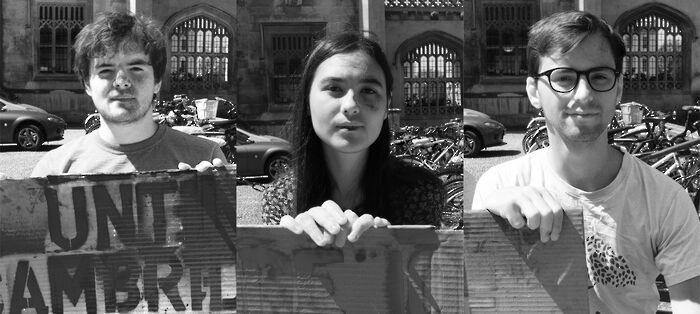Hunger strikers end protest as divestment decision date remains unclear
The three students have ended their strike in light of the Council’s indecision and of their “own families’ wishes”

Three student protesters have ended a six-day hunger strike after Cambridge’s top executive body delayed a long-anticipated decision on fossil fuel divestment.
The strikers – Sam Warren-Miell, Ben Margolis and Beth Bhargava – all first year undergraduates, stopped eating last Wednesday, ahead of a crucial University Council vote expected today, which was postponed after the group failed to reach a decision on the recommendations of its divestment working group.
The three told Varsity that “in light of the success of our actions in preventing the Council’s undemocratic capitulation to financial bureaucrats today, and in light of our own families’ wishes”, they “have decided to suspend their action on this, its sixth day.”
They added: “We would like to thank everyone who has supported us during this time, especially our friends in Zero Carbon Society, King’s College and Robinson College.”
An occupation of several of the University’s administrative offices, at Greenwich House, will continue. Students have barricaded doors, and created a study space for those with impending examinations.
The hunger strikers – who had vowed not to eat until Cambridge committed to full divestment from fossil fuels – faced the prospect of severe physical deterioration, with the University setting no clear date for when the University Council will next convene.
The three strikers described their increasing discomfort to Varsity on Saturday, saying hunger had caused them to lose sleep. One of them, Warren-Miell, nonetheless addressed students during a rally held this morning, invoking John Donne in an appeal to environmental action. After his speech, he sat and rested against a wall, and was brought water by several protesters.
Students have escalated their protests in recent months in the build-up to the report of Cambridge’s divestment working group. The full report, published today, made a series of recommendations, including that the University should commit to being carbon neutral by 2040, but fell short of recommending a commitment to full divestment.
CUSU President Daisy Eyre, who sits on the Council, criticised the report as “ignoring a democratic Grace of Regent House and the voices of many members of the University community.” Its contents divided the University’s trustees, who were unable to reach an agreement despite an extended meeting.
A University spokesperson said: “The Council did not complete its deliberations on the report’s recommendations during today’s meeting, but will return to provide a detailed response urgently.”
 News / Cambridge student numbers fall amid nationwide decline14 April 2025
News / Cambridge student numbers fall amid nationwide decline14 April 2025 News / Greenwich House occupiers miss deadline to respond to University legal action15 April 2025
News / Greenwich House occupiers miss deadline to respond to University legal action15 April 2025 Comment / The Cambridge workload prioritises quantity over quality 16 April 2025
Comment / The Cambridge workload prioritises quantity over quality 16 April 2025 Sport / Cambridge celebrate clean sweep at Boat Race 202514 April 2025
Sport / Cambridge celebrate clean sweep at Boat Race 202514 April 2025 Features / The TikTok college: using social media in access and outreach15 April 2025
Features / The TikTok college: using social media in access and outreach15 April 2025







